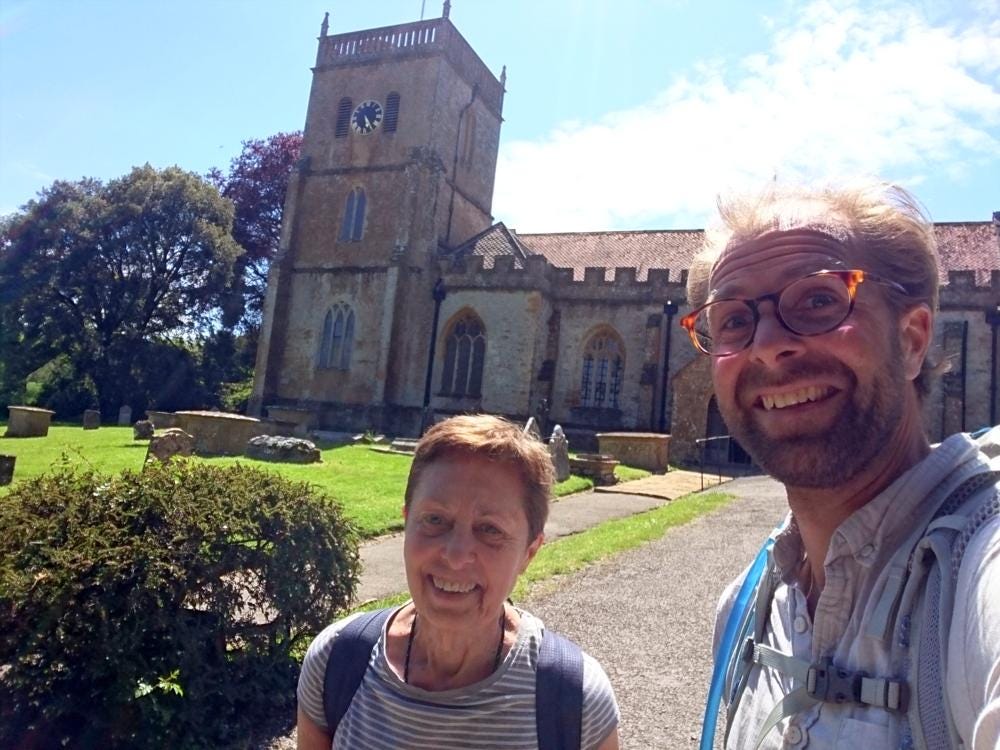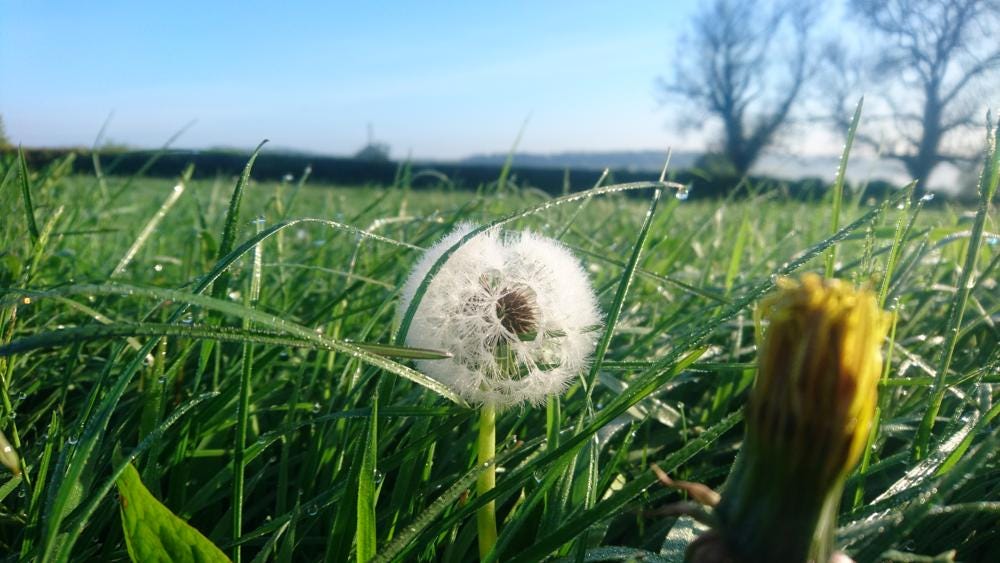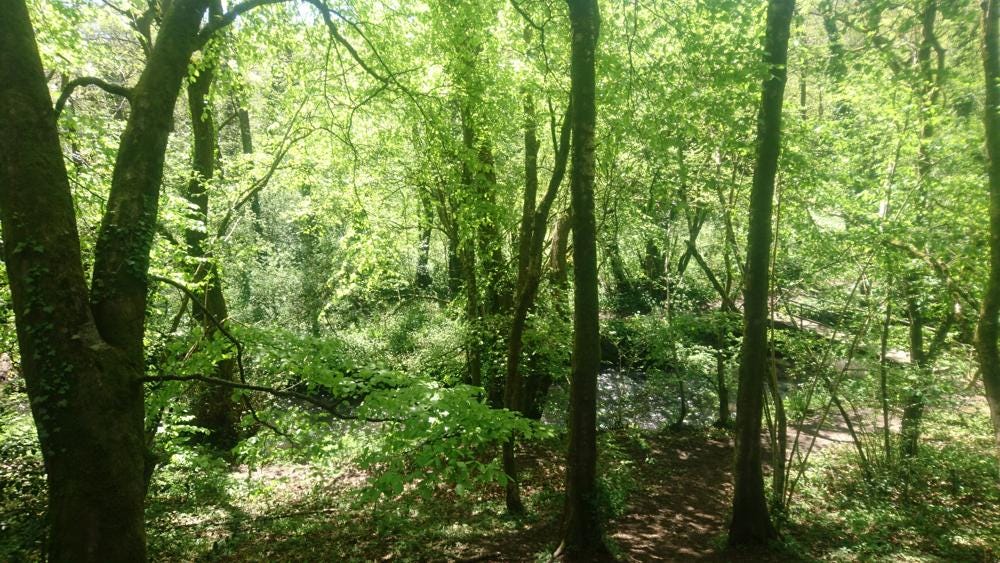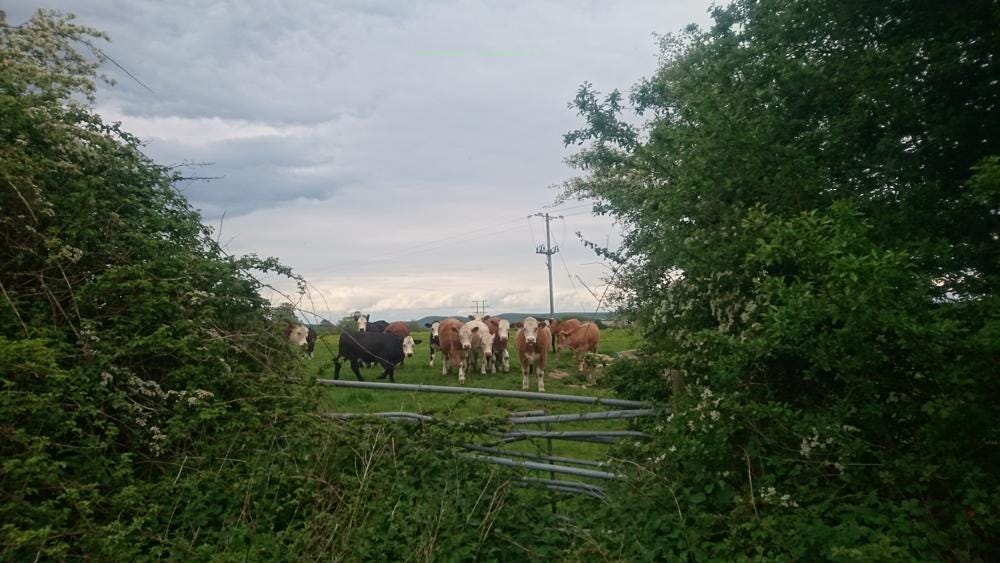Unexpected?
The unexpected tea room is my favourite part of any English journey. The tea room that hoves into view at exactly the moment it shouldn’t, in exactly the place it shouldn’t, but, inevitably, must.
Happy Friday!
And welcome to edition 271. For those of you who are new around these parts, my name is David Charles and I’m a UK-based writer and outdoor instructor.
Apologies for the unexpectedly late running of this service—on Friday and Saturday I was still rambling through the second quarter of my Four Quartets walk, continuing the journey from Bath, where on Wednesday evening I watched Ralph Fiennes perform T.S. Eliot’s poems, to East Coker, where the poet’s ashes are filed away for safe keeping.
I would’ve sent you an email from Bournemouth on Saturday evening, but, on Bank Holiday weekends, the town is so crowded that my phone can’t summon enough data to supply me with a connection to the Internet.
I reckon I’ve just got time to send this email before everyone wakes up and starts checking Instagram. I can already hear the jet skis…
Unexpected tea room
[Poetry is] a raid on the inarticulate
With shabby equipment always deteriorating
The walk ended, as all walks must, at an unexpected tea room in East Coker, being persistently undercharged for an homemade fig quiche, a vegan hot dog (with red onion pickle) and pots of tea in the sunshine.
The unexpected tea room is my favourite part of any English journey. The tea room that hoves into view at exactly the moment it shouldn’t, in exactly the place it shouldn’t, but, inevitably, must.
The contradiction, you would think, must be unprofitable for these scions of Douglas Adams’ Improbability Drive, where the laziest deus ex machina is our hard-working deity in a world predicated against the odds.
But this contradiction is exactly why these unexpected English tea rooms thrive and, being so unexpected, can be utterly relied upon.
Unexpected Four Quart£!5
Like Douglas Adams, T.S. Eliot also understood the unexpectedness of the English journey. Burnt Norton, East Coker, The Dry Salvages, Little Gidding: the titles in Four Quartets are themselves a journey.
Burnt Norton, East Coker and Little Gidding are old time English thatch and stone, dependable, ecumenical, wrapped in a comfort blanket of bucolic countryside.
The Dry Salvages, a garbled hearing of ‘les trois sauvages’—‘the three savages’, are a rock formation off the coast of Cape Ann, Massachussetts, infamous for wrecking fishing vessels in violent storms. The unexpected.
Four Quartets was written as Eliot entered later middle age and discovered that, contrary to the disinformation put about by stairlift manufacturers, there is nothing of value in the ‘autumnal serenity and … wisdom of age’.
Elders, Eliot reports with growing consternation, have no great secrets to hand down to us, passing on only a ‘receipt for deceit’, and their age begets, not wisdom, but folly, fear and frenzy.
‘It was not,’ Eliot writes, ‘what one had expected’.
Unexpected walk
There is, it seems to us,
At best, only a limited value
In the knowledge derived from experience.
The knowledge imposes a pattern, and falsifies,
For the pattern is new in every moment
And every moment is a new and shocking
Valuation of all we have been.
My knowledge, derived from experience, of the fields and byways of the English lowlands and its villages, deceived the unfamiliar into the familiar.
Evercreech, in Thursday's six o'clock electric heat, is Midsomer by another name. The church, the stone, the inn, the fields cut about with hedgerows, ageless villagers taking a turn or pottering at the gate, jumpers folded over shoulders. It’s a pattern I’ve seen repeated in villages from Burnt Norton in the high Cotswolds, all the way through Gloucestershire and into Somerset.
In a warm haze the sultry light
Is absorbed, not refracted, by grey stone.
But there is no pattern, for the pattern is new in every moment.
Walking in summer is not like walking in winter. Over four days of almost unbroken sunshine, I wasn’t expecting to get my feet so sodden that they wrinkled pink. But the lush young grass and cow parsley up to my ears conspired with the dewy mornings to drench my boots in a refined distillation.
With untroubled views over open country, garlic, beech and bluebell, I wasn’t expecting navigation to be so hard. The footpaths were untrampled, unreadable in places. Every field a question mark, as rights became wrongs of way, running into deadend brambles, thickets of thistles, shin-raking nettles or electric fences of cattlebeasts.
Unexpected cattlebeasts
In the field, human or beast, winter is a time for hibernation. But the hot stink of early summer, human or beast, tickles the hormones. The key is to distance yourself from biologically inaccurate catch-all terms like ‘cow’ and to correctly classify your cattlebeasts—before unlatching the field gate.
Dairy mothers are placid, calmly curious, watchful in the afternoon. But adolescents, the heifers, are troubled, unsupervised, driven to distraction from distraction by distraction—and keen to test their herd immunity against interfering walkers.
Unexpected performance
All this time, I’ve been talking backwards, from tea room in reverse.
The journey actually began on Wednesday evening in Bath, where I had been to see Ralph Fiennes give a highly improbable performance of Four Quartets.
What were the chances that a famous actor would alight upon the idea of a staged reading of a remote poetry cycle, written by an author long-dead, performed in a socially-distanced theatre only a quarter full, in a town where I had elected, before Christmas, to break my pilgrimmage walk based on the titles of that same obscure poem?
The chances, both Adams and Eliot concur, were so improbable as to be almost certain.
Having listened to Alec Guinness’s somewhat sententious BBC recital, I wasn’t expecting something so conversational. But Fiennes made total sense of Eliot’s variations and abrupt shifts in tone. Like someone trying to explain the ineffable. Which is exactly what he was. For the first time, lines I’d never fully understood came swimming into clear focus.
I think he was a little ill, however. 75 minutes into the 77 minute performance, shining with rheumy fever, Fiennes took a seat at a table and you could almost see the finish line reflected in his mind’s eye. He galloped onward through the final stanza—
We shall not cease from exploration
And the end of all our exploring
Will be to arrive where we started...
—and then he stopped.
A dramatic pause, we thought. He closed his eyes. A very dramatic pause. A pause so dramatic that it burst beyond the confines of the auditorium and bent the laws of space-time.
Then he began muttering the lines to himself, trying to regather the unspooled thread. The most famous line, perhaps, in the whole poem. Brainwaves pulsed from audience to actor. One man could bear the tension no longer and cried from the stalls: ‘And know…’
Fiennes opened his eyes, switched on.
Will be to arrive where we started
And know the place for the first time.
Fare forward, voyagers!
~
Huge thanks to mum, who joined me for the last couple of days of the walk. Thanks for sharing the footpaths, the poetry of T.S. Eliot, your snacks and your company!

D.G.
This tweet from Nika Dubrovsky, David Graeber’s wife, simultaneously made my Tuesday and made me cry a little bit.
David Graeber’s body of work lives on as an online ‘non-institution’ and the trustees are looking for people to get involved.
This email was 12.34 percent funded
▲▲▲▲△△△△△△△△△△△△△△△△△△△△△△△△△△△△△
This email took me lord alone knows how long to write, work that is entirely supported by lovely readers who reckon this newsletter is worth some of their hard earned dosh.
If today’s story has made your inbox a better place, then I’d be honoured if you clicked one of these soothing lavender-coloured buttons:
Thanks to everyone who said hello last week, and especially to H.S. who became a subscriber! 🍾
100 Days of Adventure
🟢🟢🟢🟢🟢🟢🟢🟢🟢🟢🟢🟢🟢🟢🟢🟢🟢🟢🟢🟢🟢🟢🟢🟢⚪
⚪⚪⚪⚪⚪⚪⚪⚪⚪⚪⚪⚪⚪⚪⚪⚪⚪⚪⚪⚪⚪⚪⚪⚪⚪
⚪⚪⚪⚪⚪⚪⚪⚪⚪⚪⚪⚪⚪⚪⚪⚪⚪⚪⚪⚪⚪⚪⚪⚪⚪
⚪⚪⚪⚪⚪⚪⚪⚪⚪⚪⚪⚪⚪⚪⚪⚪⚪⚪⚪⚪⚪⚪⚪⚪⚪
That’s it for this week and a half. This week is inside out—working on the Bank Holiday today and over the coming weekend, with a holday sandwiched in between.
May your sun be ice creaming!
Big love,
dc:






